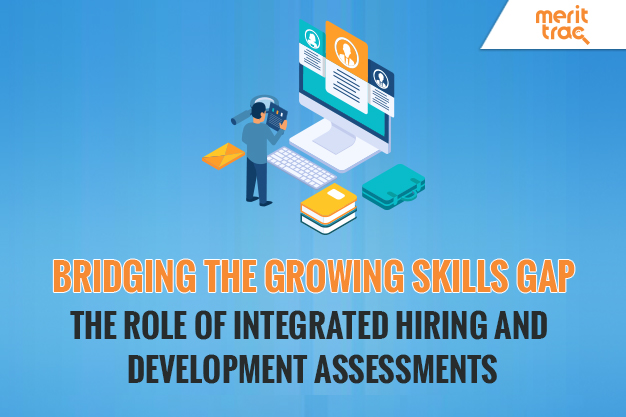
Bridging the growing skills gap
Date: 08/07/2019 | Posted by: MeritTrac | Category: Corporate , Employability Skills
Bridging the growing skills gap: The Role of integrated hiring and development assessments
The Indian Government recently announced the constitution of two high level Cabinet Committees to investigate the two pressing issues - economic slowdown and unemployment. This doesn’t come as a surprise. The unemployment rate doubled over the last two years, hitting 7.6% in April 2019. At the same time, there are growing concerns around the widening skills gap in the country which is expected to result in a $1.97 trillion loss to the economy. To compound the situation further, an increasing number of educated millennials are turning down offers from privately-owned companies and looking for government jobs instead.
These developments send dangerous signals to enterprises that are already grappling with a dearth in quality resources. Addressing the issue calls for a two-pronged strategy. On the one hand, organizations must enable hiring approaches that ensure the right match of talent with opportunity. On the other, they must deploy employee development strategies to minimize skill gaps. Let’s deep dive into how they can do this.
Hiring best practices- Continually assessing recruitment processes and methods is a vital first step in winning the war for talent. More often than not, the focus is on the list of technical skills provided to the hiring organization. New-age organizations are now trying to take a more evolved approach by recruiting for skills and competencies that go beyond technical skills. Critical success skills such as work attitudes and people-management capabilities are taking centre stage when assessing new hires today.
Scientifically designedpre-hire assessments can help organizations perform a 360 degree evaluation of potential candidates, including hard-to-assess skills such as critical reasoning, empathy and ethical judgement. Such assessments are also instrumental in the success of campus hiring strategies. Amazon, for instance, uses several different assessments and scientific tools for potential candidates - including AI enabled recruitment tools. From traditional numerical, verbal, logical reasoning tests to psychometric tests and cognitive assessments that include deductive reasoning and role plays, Amazon has experimented with a whole gamut of scientifically designed tools and assessments.
Employee development approaches – Assessing for skills does not end with hiring. It is equally imperative to assess for skill gaps in existing employees in order to equip them with the right capabilities – in sync with evolving technologies. How can the organizations do this effectively? As a first step, team managers and leaders can leverage an array of cognitive domain and personality assessments to identify skill gaps in their team members. They can then design targeted training programs to address specific skill gaps such as developing strong people and communication skills in the workplace. Take the case of Salesforce. The company customizes their Learning and Development (L&D) program for individual employees based on assessments. To maximize employee productivity in sales, they adapt their home grown Trailhead interactive platform for salesforce training. The notable feature of this platform is the ability to design one-on-one learning journeys to meet each individual employee’s unique personal development needs and goals.
At a time when unemployment rates among young urban job seekers in India is on the rise, high expectations cantered purely on technical skills makes hiring right-fit candidates a highly challenging task. An integrated approach that combines online assessment tools for hiring with assessment-backed training and development can help revolutionize the recruitment game, allowing organizations to nurture new as well existing employees into successful contributors.
References:












 Sales Hotline: USA: +1 646 916 0939 / Others: +91 80619 14700
Sales Hotline: USA: +1 646 916 0939 / Others: +91 80619 14700


